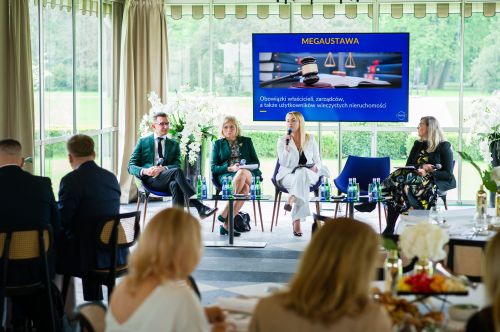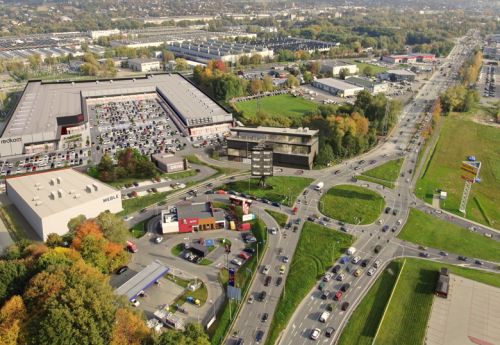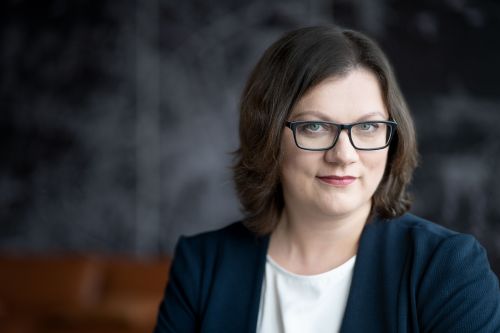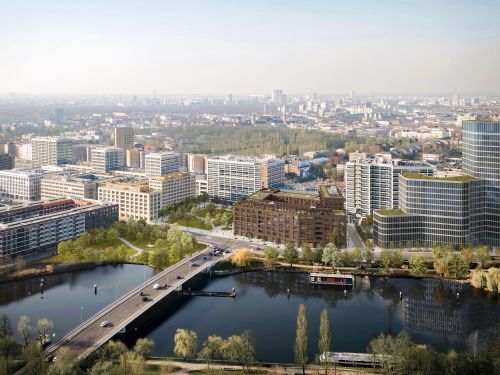Spreading their wings
Human resources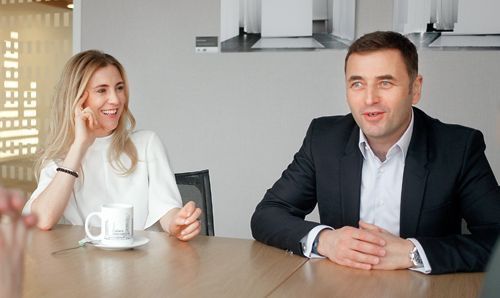
‘Eurobuild CEE’: Compared to other agencies, Colliers arrived on the Warsaw scene relatively late. Who took the decision to enter the Polish market and why at that particular time?
Robert Karniewski, partner, Colliers International Poland: It was the CEO John McLernon who decided to enter the Central and Eastern Europe market. The company in Poland was set up in autumn 1997 and the first job interviews took place in 1998, but Colliers was a completely unknown quantity at the time. There was no wider strategy, but we were convinced it was going to blossom into something great. Our first office was located at ul. Marszałkowska 82, a boy scout shop at the time.
Monika Rajska-Wolińska, managing partner, Colliers International Poland: At the beginning a franchise was created in Poland (the company is Canadian), but John came to the conclusion that instead of operating as a franchise the company should be directly engaged in CEE countries.
Robert Karniewski: Well, that’s true, but Colliers had been present in this part of Europe before 1997. Branches existed in the Czech Republic, Hungary and Romania. The office in Poland was opened later. The development of Colliers in the CEE region sort of started backwards, as we should have opened the Warsaw office first.
Monika Rajska-Wolińska: ...but we have made up for it.
Robert Karniewski: We certainly have, but it didn’t look like that at the start. We took a leap of faith, with no safety net if things went wrong. The market then was totally different to what it is now. We started out with offices and warehouses, but it was offices that played the dominant role. In terms of working with clients, co-operation and so on, it was like the Wild West. Our working standards then also differed greatly, too. Neil turned up here in 1999 and made our activities more systematic and defined the scope of the company’s activities. In 2000 he was appointed head of the CEE region (a new position) by John. There were just three or four office buildings in the city at the time, so it was the developers who were the major players and tenant representation was unheard of. It was then that Neil separated the office and warehouse departments.
Monika Rajska-Wolińska: When I joined the company, it employed seven people. The market was in its infancy and we were growing up with it. We were excited by every single deal. Every tiny little contract made us as happy then as a 10,000 sqm deal does now.
Robert Karniewski: However, closing the deal did not mean the end of our duties. You had to issue the invoice and make sure that it was paid. When this was finally done, you could then let your hair down. All the real estate people used to go to the Barbados club in Warsaw. However, the most important thing was to attract new clients, maintain direct contact with them and cold-call them. Today things are slightly different, with such developments in technology as email, all the various apps that make direct contact with clients unnecessary. Since we were not backed by a recognisable large company, we had one other additional challenge to face. Still, this had its advantages. In 2002–2003, when there was a slowdown, we were able to move forward. Our small size turned out to give us a competitive edge.
If I asked you for an anecdote about your company, which one would you choose?
Monika Rajska-Wolińska: When Hadley Dean came to us from King Sturge, we threw a party. Hadley came to work at 7 a.m. the next day, wearing sunglasses, but he did turn up first thing in the morning. So he came in and asked if we had done the morning press briefing yet... but we were still hung-over. And then he was like: “Party as much as you like – but make sure you come here ready for work in the morning.” Meet Hadley, our new boss.
Robert Karniewski: He had a favourite pastime, too. All it needed was a PVC pipe, an elbow, some butane for the ignition and... some grapefruits. Once the whole thing was assembled, it turned into a fruit launch pad with a pretty good range – from ul. Rajców street (where the Mint is located) as far as the river Vistula. Sometimes we ran out of fruit... and that was a great opportunity for anyone applying for a job in our company. Once Hadley said to one of the candidates: “Look, we’ve just run out of grapefruit and the shops are closing in 20 minutes. Go and get some and you’ll get the job.” That’s how the retail department started in our company.
Here’s another one. We were at an integration meeting. At these parties we used to jump on Hadley and try to knock him over, which, given his size, was not easy. This time we ended up rolling him over the floor. Then the restaurant manager couldn’t take it anymore and came over to Monika, who was leaving the party, and said: “Madam, please do something, don’t leave me with them! Could you have a word with their boss, please?” And Monika replied (pointing at Hadley being rolled over the floor): “That’s him.”
What was the turning point in the company’s development?
Robert Karniewski: We were multi-functional for the first two years. In 2000–2001 the situation began to change. It was separated into two departments: office and warehouse. That was the first stage of the organisation of the company.
Monika Rajska-Wolińska: We started to set up a real estate database; we created a valuation department; we began to specialise. These were the beginnings. As a company we gained added momentum when in August 2001 Hadley arrived from Prague – a typical British guy, who started getting things organised. New departments were established, including the financial and the aforementioned retail department. We were in constant competition with both other companies and other Colliers branches in the CEE region, particularly with Romania, which had been the leader for a long time. Eventually we managed to overtake them and Poland has been the leader in the CEE region ever since.
Did you ever experience any crisis situations?
Monika Rajska-Wolińska: Yes, shortly after Hadley arrived. He used to come to work carrying a King Sturge umbrella. In our office we had a board showing the deals we were working on. And Hadley would bring his friends round from his previous company, and they could see the board and our clients. So we finally put our foot down and said: this has to stop!
Robert Karniewski: This rebellion occurred at the end of 2001.
Monika Rajska-Wolińska: We called a meeting and agreed to tell him about the things we didn’t like and that he had to change them. We also informed Neil that if Hadley didn’t accept our conditions, we would like him to leave. Some years passed before Neil admitted to immediately calling Hadley and telling him: “Don’t say a word, keep nodding and accept everything, we’ll talk later.” And I must say Hadley changed after that.
Robert Karniewski: But not right from the start... the turning point was our corporate trip to Lake Balaton a few months later. Hadley arrived a day later. We were staying in lodges and at one point we were all watching a match, Brazil vs England, in one of them. Our gang were cheering: “Brazil! Brazil!” Hadley got upset but something just snapped in him. He watched the game with us until the end and so we decided that the job was done. That night was a breakthrough.
Monika Rajska-Wolińska: We began to work together and it was a really good time for the development of our company, too. I remember Hadley bringing in a board on which we all signed a pledge: “This year our deal volume is going to be USD 10 mln.” We were making maybe half that amount at the time and we thought it was rather unlikely to happen, but we took on the challenge and achieved that goal, making even more than USD 10 mln.
What’s the management style at Colliers now?
Monika Rajska-Wolińska: We are not a typical corporation. I don’t get orders from my superiors about individual decisions, for instance, the opening of regional offices. We make independent decisions based on the potential of each location and for our expansion onto new markets, as in the case of our offices in Kraków, Wrocław, Poznań, the TriCity, Łódź and Katowice. We have a great deal of freedom and we treat each other as partners. Once one of our customers summed up our working style by saying: “You know how I picture Colliers? I’m on a desert island and I want someone to rescue me. I see a huge liner that has everything – lifeboats, a swimming pool, a disco, etc. The thing is, it’s too big to approach the shore. And then I see a small, fast and manoeuvrable yacht approaching from the other side, and this is your company. You are a boutique company, so you can tailor your services to the needs of your clients.” A second anecdote about our management style is about an employee who came to us from a rival company. He kept coming to see me about a variety of issues, such as diagrams, holiday requests, and so on. And so I finally told him: “Give me a break and just do your job.” He just stood there, looked at me, and said: “My previous company gave me a car, people and a destination, and I went there. And you tell me to choose a car, a team and, on top of that, a destination.”
Is he still with you?
Monika Rajska-Wolińska: Yes (laughter). I think we give our employees plenty of freedom, we give them the space to have a creative approach to their work, and we let them spread their wings. Talking of crises, hard times have actually helped to bring us together, especially in 2008. We spent hours mulling over what to do. We didn’t want to lay people off. We reached an agreement with our employees to cut their salaries by 7.5 pct. We promised to bring back the previous rates once the market bounced back. Only two people did not accept the changed terms, and at the time we employed 150 people. This really strengthened our team. Having managed to keep all the tried and tested people, we were ready for the return of economic growth.
What about the 2002–2003 crisis?
Monika Rajska-Wolińska: This was exceptional because it was the first crisis that had affected us. Everything suddenly came to a standstill, but we came out of it stronger and with adequate profits.
Robert Karniewski: We avoided the basic mistake people sometimes make out of pride. When property owners were faced with critical situations, we didn’t turn our backs on them and we maintained a healthy approach to the situation. It’s not only all about financial results, but also about relationships and trust. We showed them we were in this together. And getting outside Warsaw was also a huge breakthrough.
Which branch was the first?
Robert Karniewski: In 2007 we opened our office in Kraków. We set it up with Paul Higgins, who came to Poland from New Zealand.
Monika Rajska-Wolińska: No one suspected at the time that a student, tourist and cultural hub, with 15 pct of its buildings vacant, would develop in a businesslike way and become an outsourcing centre. The official opening ceremony took place on a barge and Hadley was shooting grapefruit, as usual.
Robert Karniewski: Other offices followed. There are six of them at the moment and they sprang up quite quickly. When returning from the opening of the Gdańsk office I began to wonder why we still didn’t have a Łódź office.
Monika Rajska-Wolińska: Another breakthrough for Colliers was attracting a global investor in 2007. This was FirstService. It gave us huge financial support and the franchise began to become a thing of the past. Up to the present day, buying out all the franchises has been Colliers’ strategy. Another turning point for the company was my appointment as manager in 2011. Hadley wanted to develop his career within the structure of the company and work across the region. But someone had to replace him in Poland. The partners wondered if we should be looking for someone from the external company or if we should rather promote someone internally. Eventually, a vote took place and I was selected. I was the first Polish woman to be appointed manager of a leading commercial real estate consultancy company in Poland.
Robert Karniewski: We were all a bit anxious about that change. It was a new situation. It is a great challenge both when the market is soaring and when it’s plummeting. Later we started investing in regional cities. Kraków was followed by Wrocław.
What about Szczecin?
Robert Karniewski: Szczecin was a good idea, but prematurely implemented. There wasn’t enough activity there – the market was like a minefield. But I think that the principle of hiring people previously associated with local government in regional offices works pretty well.
What about new expansion plans?
Monika Rajska-Wolińska: Currently we are working on a workplace and change management strategy. We have created a Workplace Innovation department, consisting of change-management experts, sociologists, psychologists and architects. We are carrying out research into corporate culture, for instance, for Pracuj Group. I can see the potential in this area. We want to grow not only organically, but also through acquisitions. We are looking for different opportunities in Poland.
I’ve heard about talks with Reesco...
Monika Rajska-Wolińska: Did you? [laughs].
Robert Karniewski: We have the company’s support, but no one is forcing us to do anything. We are looking for the best people, someone who will fit into our team, and someone who will be in tune with us quickly. It is crucial to integrate quickly, to adapt and seamlessly enter the company structure.
We mentioned Szczecin, which turned out to be a failure. And not only for you. Any other painful life lessons?
Monika Rajska-Wolińska: Lots of them, as happens in business. Our auction department was one of them. We had this idea of internet auctions for apartment sales. They are extremely popular in the West. We created a suitable platform with the owner of Desa. However, the market did not respond to it. We still haven’t given up and are trying again, though. I like it when something is going on. I’ve got two more ideas for new departments up my sleeve.
Robert Karniewski: I wouldn’t like to give the impression that we’re talking about mere fantasies. We think seriously about business. We are prolonging our lease agreement in the Metropolitan for the next nine years and increasing the space we occupy by around 20 pct.
How many people are currently employed by Colliers?
Monika Rajska-Wolińska: We currently we have 300 employees. Robert, how many people do you think will be working for us in five years’ time?
Robert Karniewski: I don’t know, but I wonder how many processes we can automatise. I think we’ll be able to use a lot of new gadgets in the facility management sector, so we can employ fewer people there. In total, I’d say we might have 150 additional employees.
Monika Rajska-Wolińska: I think there will be 500 employees in total. Automatisation, automatics and technology are trends that will have a huge impact on our market in the long run. Our profession may not become obsolete, but it will be less necessary. Once we had unique data, but now it’s available to the public. Soon lots of work will be done by computer systems. This is not only our problem, it’s something that also affects consultancies in general. Recently I had a conversation about it with someone from the so-called Big Four. Even now many processes in banking are carried out by computers. Machines analyse our credit rating, robots send us notifications and collect the payments. It is estimated that over 50 pct of people employed in the banking sector will lose their jobs. Hence the restructuring of our valuation department, where many processes have already been automatised.
Robert Karniewski: I can also see that many processes take place in the centres located, for example, in the US or London. This means less work for us.
What are the biggest challenges for you as a manager in the development of the company?
Monika Rajska-Wolińska: There are two linked aspects: on the one hand, the fact that building owners set up their own expert teams, so it’s getting harder and harder for us to get an order; and, on the other hand, there are dilemmas over how to keep a motivated, efficient and satisfied team that will not want to change jobs. We employ a mix of experts with many years of experience and a group of young people. I try to look after them. We give them extensive training – not only about real estate, but also about how to give and get feedback from a customer or an employee, for instance. We are organising soft skills training, which includes not only presentation, negotiation and public speaking, but also personality types, in order to be able to talk to clients and understand their behaviour and needs. We teach empathy. My task is to keep a great team that will develop itself. Last year we introduced Smart Leader training for managers and heads of departments, and the Top 20 devised for the twenty best employees from every department.
Robert Karniewski: In my opinion the global challenge is also the fact that many people do not respect their work. They often work for the market share only, not the margin for the service.
Building from scratch
Monika Rajska-Wolińska, managing partner, Colliers International
As managing partner for Poland, Monika’s responsibility is to lead and manage the strategic and operational activities of the company. She has twenty years of experience in real estate. She is a member of the Royal Institution of Chartered Surveyors, the CEO Round Table, the Young Presidents’ Organisation and the Foundation of Women Leadership in Business. Her passion for real estate and emphasis on providing comprehensive customer service has won recognition among market professionals. Monika is one of twelve members of the Colliers EMEA board, which determines the development of the company in markets in Europe, the Middle East and Africa.
Robert Karniewski, partner, Colliers International
Robert has twenty years of experience in the commercial market and for the past nine years has been developing the network of Colliers’ regional offices in Poland. Together with the Colliers team, he has participated in deals in the office market in Warsaw and regional cities amounting to over 1.3 mln sqm. He specialises in initiating and maintaining long-term relationships with customers, as well as in the promotion of Poland in the international arena and attracting international investors. Colliers office department closed 2016 with a record-breaking 242,000 sqm of leased space.













